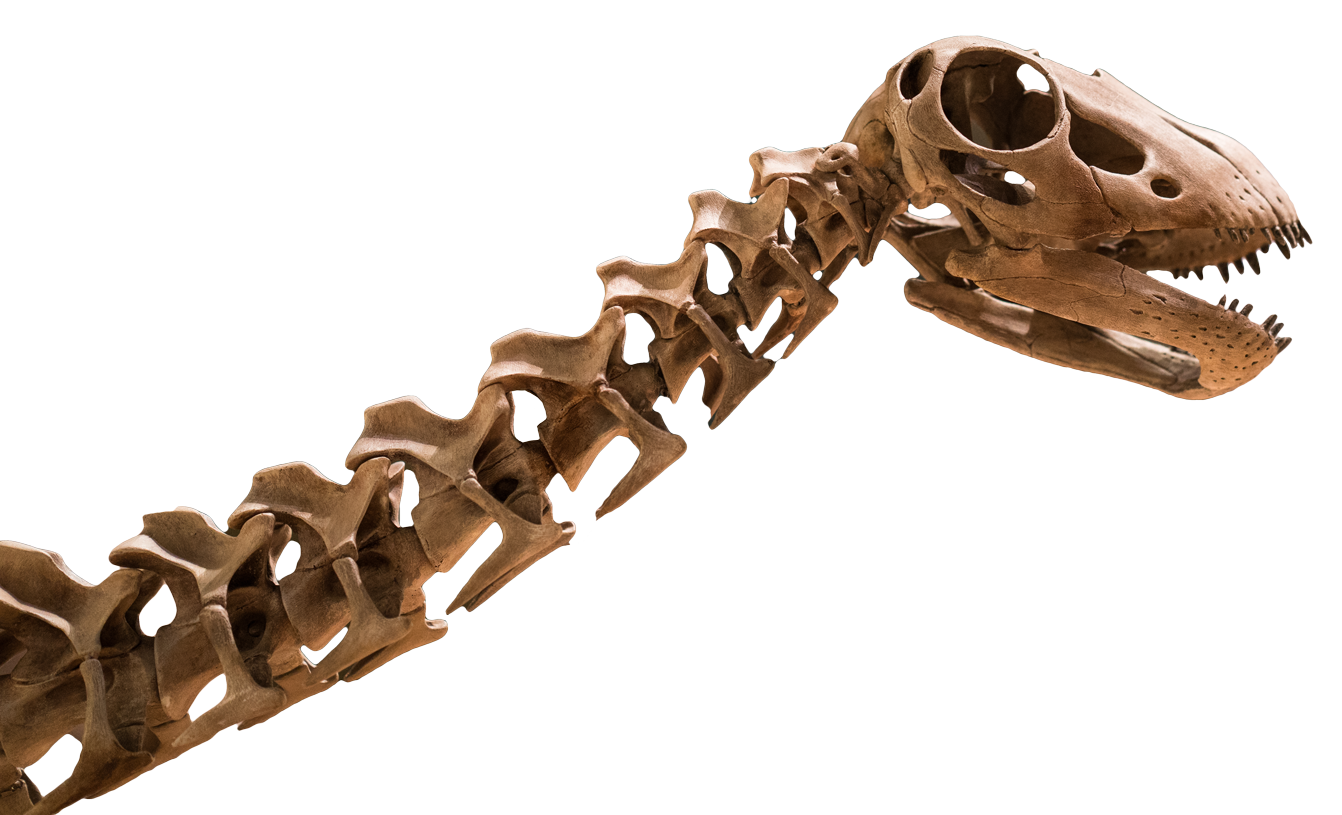
To help sustain Native languages across the state and the nation, the Sam Noble Museum and the Department of Native American Studies in the Dodge Family College of Arts and Sciences at the University of Oklahoma have launched a new Native Language Fair Honor Fund.
Established to honor past Native speakers, ancestors, and relatives of the past, present, and future who have worked closely with the language fair, the goal is to continue their legacy by creating a sustainable future for the fair. This fund contibutes toward an endowment for the event that will generate consistent and stable funding, enabling the museum to provide students with a venue to share their Native languages and support broader language revitalization across Oklahoma.
At least 14 elders who have been longtime supporters of the language fair have passed away in recent years. Their loss is deeply felt both at the museum and in their communities. The goal is to carry on their legacies and their passion for the preservation of Native cultures and languages through the fair.
To make a contribution to the Native Language Fair Honor Fund, you can follow the link below.
To honor a specific elder, select “this is an honorary or memorial gift.” Information about the specific individuals honored through the fund will be made available online and at the language fair.
2025 Honorees
Juanita Pahdopony
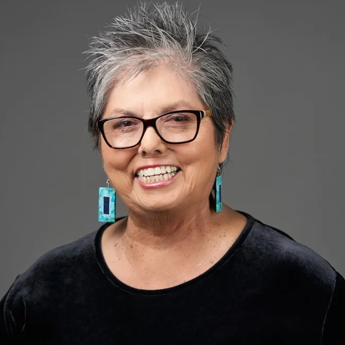 Juanita Pahdopony (1947-2020) was a beloved Comanche elder and an invited speaker at the 2017 Language Fair. Her love-filled teachings as an elder, mentor, artist, and consultant were grounded in Comanche epistemology, knowledge, arts, and film. She was the lead culture and language consultant for the first season of the AMC television series The Son, which she also advised on as an administrator and art professor at Comanche Nation College. She also co-starred in Lummi filmmaker Steffany Suttle’s 2008 documentary Fry Bread Babes about Native women’s representation in American pop culture, and co-produced the short film Thistle Creek (2020), which features strong Comanche women representing in front of and behind the camera. She was also a consultant on the 2022 film Prey, which is dedicated to her memory and stands as a tribute to her everlasting legacy.
Juanita Pahdopony (1947-2020) was a beloved Comanche elder and an invited speaker at the 2017 Language Fair. Her love-filled teachings as an elder, mentor, artist, and consultant were grounded in Comanche epistemology, knowledge, arts, and film. She was the lead culture and language consultant for the first season of the AMC television series The Son, which she also advised on as an administrator and art professor at Comanche Nation College. She also co-starred in Lummi filmmaker Steffany Suttle’s 2008 documentary Fry Bread Babes about Native women’s representation in American pop culture, and co-produced the short film Thistle Creek (2020), which features strong Comanche women representing in front of and behind the camera. She was also a consultant on the 2022 film Prey, which is dedicated to her memory and stands as a tribute to her everlasting legacy.
‘Auntie ‘Nita’ helped set forth an enriching and collaborative model for film production, and her foundational consulting continues to inspire creative Natives. May her beauty, generosity, and art continue to be a light in this world and beyond, and may her loving spirit be honored and reach and inspire generations to come. U kuma kutu nu, Auntie. Always.
Rebecca “Becky” Meyer
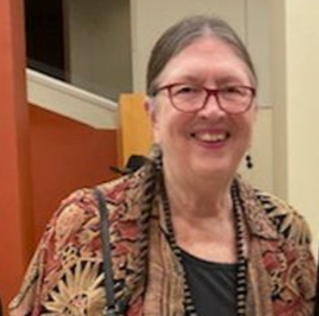 A native Oklahoman and member of the Cherokee Nation, Becky was an active member of the Native American community in the Norman and Oklahoma City areas. A former elementary school teacher, Becky volunteered her time to promote Native American language and art. She served in several capacities for Red Earth, especially with youth art activities. She volunteered at the youth registration desk at the Oklahoman Native American Youth Language Fair for many years. She also served as a judge for the Poster art category for several years. She served as a volunteer docent in the People of Oklahoma Gallery at the Sam Noble Museum from 2000 to the time of her death.
A native Oklahoman and member of the Cherokee Nation, Becky was an active member of the Native American community in the Norman and Oklahoma City areas. A former elementary school teacher, Becky volunteered her time to promote Native American language and art. She served in several capacities for Red Earth, especially with youth art activities. She volunteered at the youth registration desk at the Oklahoman Native American Youth Language Fair for many years. She also served as a judge for the Poster art category for several years. She served as a volunteer docent in the People of Oklahoma Gallery at the Sam Noble Museum from 2000 to the time of her death.
Pauline Wahpepah
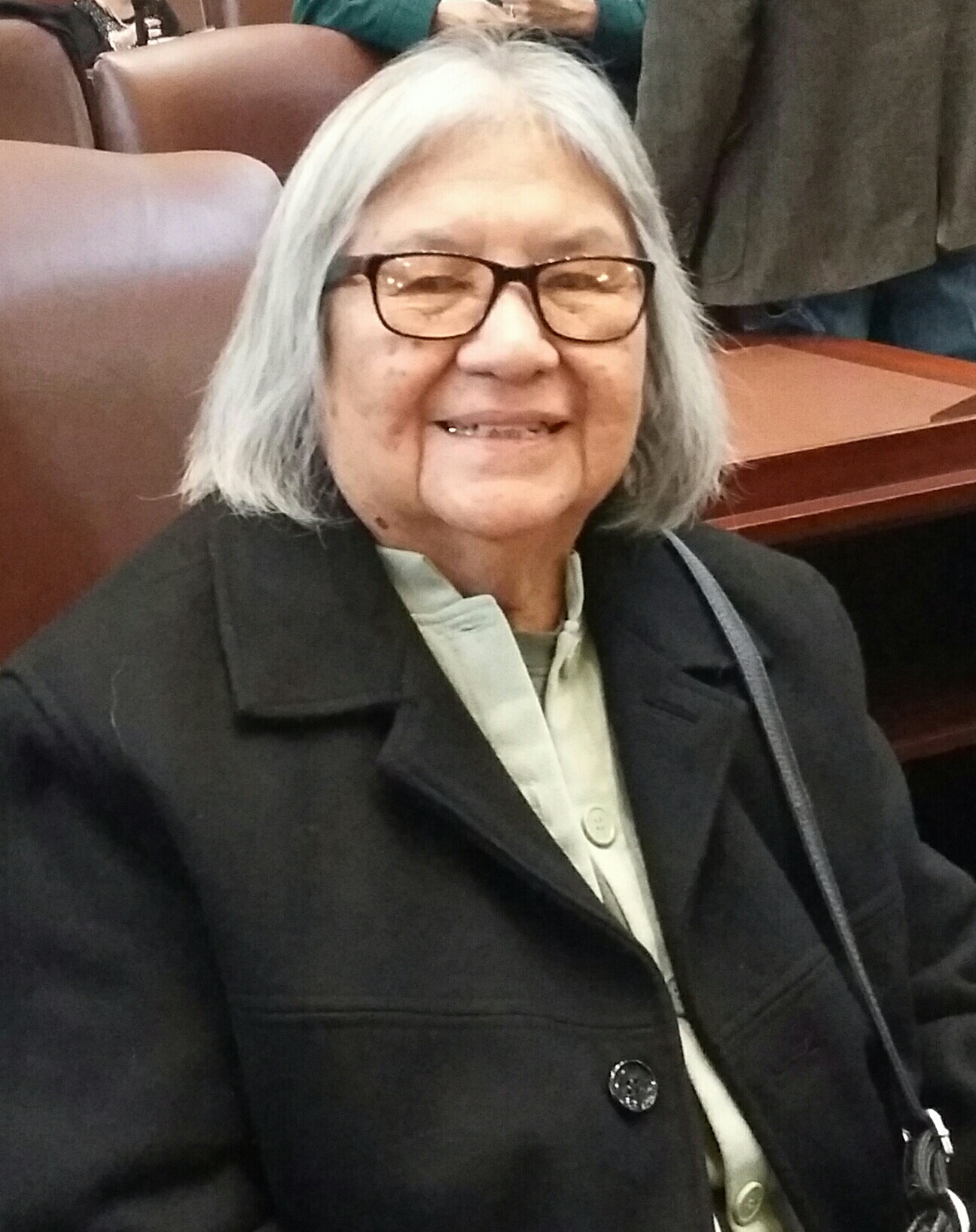
Pauline White Wahpepah was a member of the Absentee Shawnee Tribe. She was raised by her grandparents Annie Fish Atchico Hayworth (Absentee Shawnee) and James Hayworth (Kickapoo). From her grandparents she became a fluent Shawnee and Kickapoo speaker as well as learning English from the public schools. She later attended the Indian Boarding School system. Upon graduating from Riverside Indian School, she attended Haskell Industrial Training School, eventually participating in the relocation program and moving to Los Angeles, California. Throughout this time, she remained fluent by finding family and friends with whom she could continue using her languages. Upon returning to Oklahoma, she worked in various programs that allowed her to serve as an interpreter. This opportunity allowed her to witness how vulnerable Native languages were becoming. She began her work in language preservation while obtaining her Masters in Bilingual Education and certification to teach Native languages. Her approach became that as long as there is someone learning their language, there is hope that their language will continue and there will always be Native peoples. She acknowledged that it is a hard and arduous task, but it is important not to stop. The Native Language Fair was always a rewarding experience for her to see so many children using their languages.
Durbin Feeling
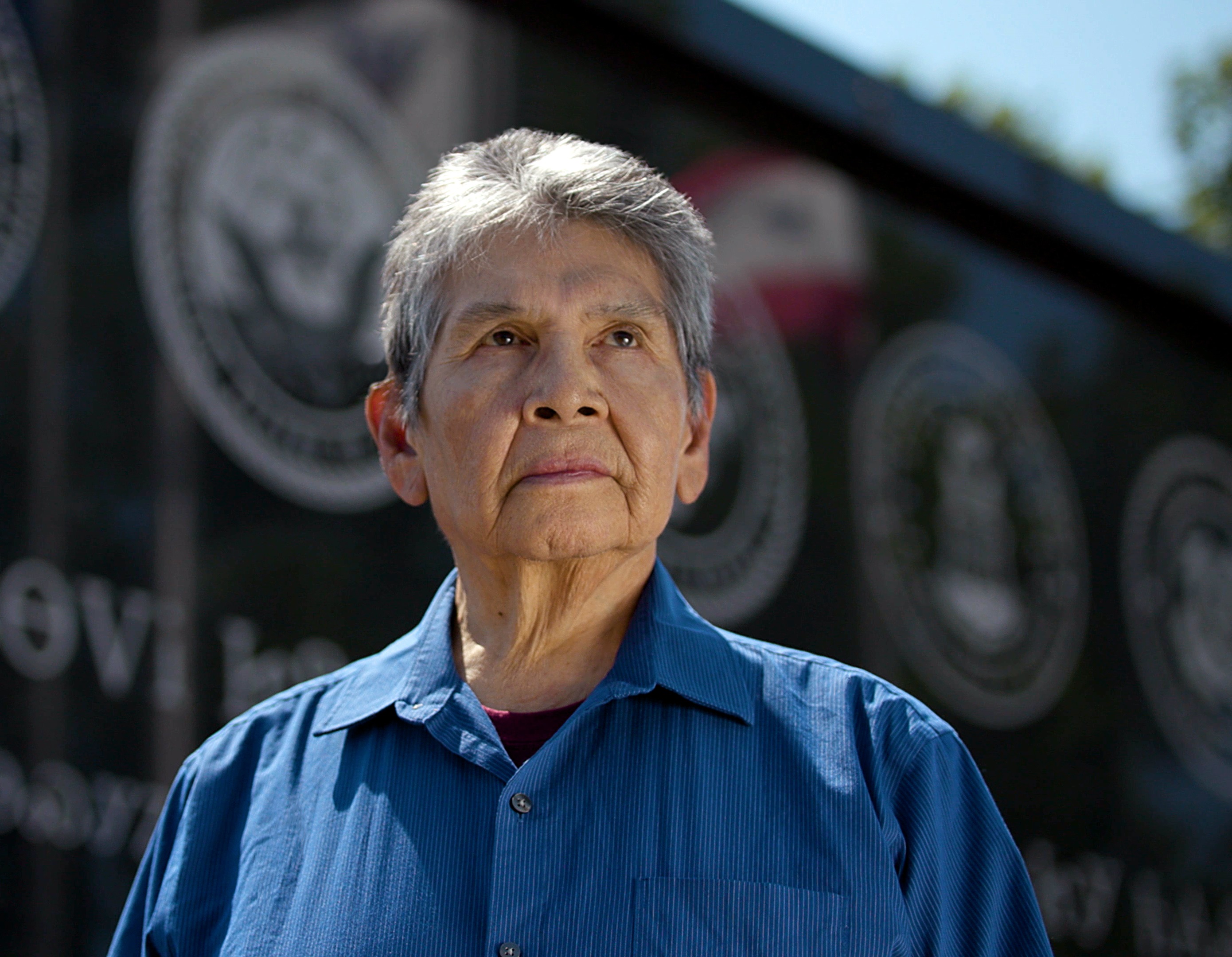 Durbin’s passion was for the preservation of the Cherokee language. This was only superseded by his constant learning of the Word of God. He served in the Army in Vietnam. He attended Bacone Indian College, and is an honorary Ohio State Buckeye. He started the first Cherokee language class at OU and his other accomplishments were numerous. He loved his wife ‘Chrissy’ more than anything and he is greatly missed. His legacy will live on at the great Cherokee Nation Immersion Charter School in the hearts and lives of all who pass through it. If he were here today his only direction would be: “Read the Bible”.
Durbin’s passion was for the preservation of the Cherokee language. This was only superseded by his constant learning of the Word of God. He served in the Army in Vietnam. He attended Bacone Indian College, and is an honorary Ohio State Buckeye. He started the first Cherokee language class at OU and his other accomplishments were numerous. He loved his wife ‘Chrissy’ more than anything and he is greatly missed. His legacy will live on at the great Cherokee Nation Immersion Charter School in the hearts and lives of all who pass through it. If he were here today his only direction would be: “Read the Bible”.
N. Scott Momaday
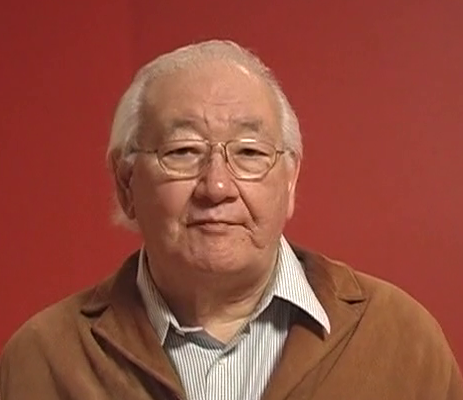
Navarre Scott Momaday was born in Lawton, Oklahoma, to a father of Kiowa heritage and a mother of European and Cherokee heritage. He spent much of his childhood on Navajo, Apache, and Jemez Pueblo reservations in the Southwest, where his parents taught. He earned his BA from the University of New Mexico and a MA and PhD from Stanford University. His first novel House Made of Dawn (1968) won a Pulitzer Prize and brought attention to Momaday as a leading figure in a Native American literary renaissance. His subsequent works have shown what richness and power can result from blending Native-American oral traditions with classical European forms. Those works include more than 13 books of poetry, plays, prose, and children’s stories. In addition to the Pulitzer Prize, Momaday has been awarded numerous honors, including a National Medal of Arts, an Academy of American Poets Prize, a Guggenheim Fellowship, and 12 honorary degrees. He is the Regents Professor of the Humanities at the University of Arizona, where he has taught since 1982.
In 2007, he was one of the guest speakers at the Oklahoma Native American Youth Language Fair.
Brenda Samuels
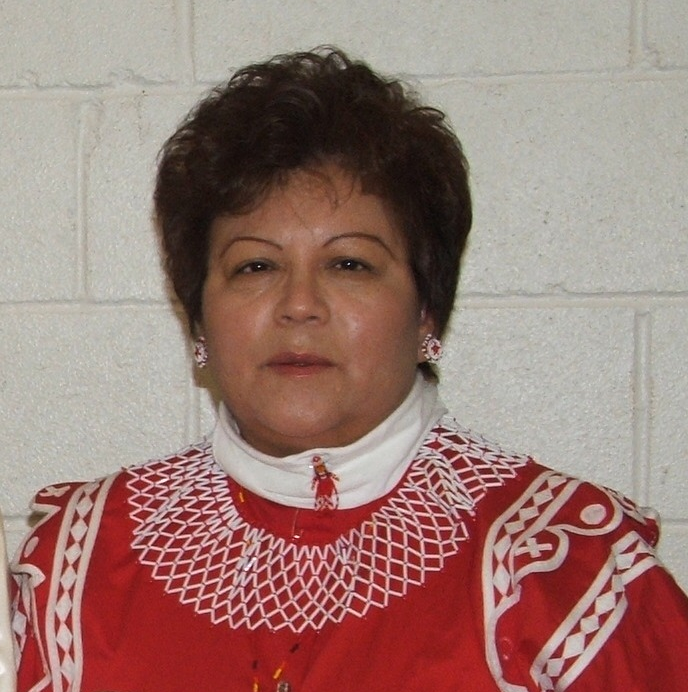 Brenda Taylor Samuels was Mississippi Band of Choctaw Indian and an enrolled member of the Choctaw Nation of Oklahoma. She was raised in Bently, Oklahoma by her maternal grandmother, Virgie Peters. This is where she spoke the Chahta language fluently, learning and living the Chahta culture. In 2001, The Choctaw Nation wanted to preserve the Chahta Language; she and her husband Norris Samuels signed up to become community teachers within the Oklahoma City area. Brenda spoke the Mississippi Chahta dialect. During the summers, she would travel back to the Mississippi reservations to stay immersed in the language and culture. During one of her visits after seeing the youth on the reservations speak fluently and immersed in the Chahta culture, it was laid on her heart to create a separate class for the youth within the Oklahoma City area, so she started Chahta Ulla. She would have her adult and youth language classes involved in local parades such as Red Earth and St. Patrick’s Day due to the relationship of the Chahta People and Ireland during Ireland’s famine. Her Adult language classes would take annual summer trips back to Mississippi Reservations during their Choctaw Festivals. Brenda made sure that Chahta Youth in the Oklahoma City area would be involved when it came to Native recognition, most importantly when it came to Choctaw Nation. The youth language class, Chahta Ulla, would participate in the Oklahoma Native American Youth Language Fair annually, placing in several divisions. They were invited to sing and participate at the groundbreaking of First Americans Museum and would travel to Southeastern Oklahoma to Choctaw Nation for youth award banquets. She started the first summer Youth Immersion Language Camp in the Oklahoma City area. All week, they would learn the language, sing tribal hymns, experience traditional foods, and create beautiful native artwork. The Children’s Immersion Language Camp was open to any youth who wanted to learn. In 2002, The University of Oklahoma had a position open for a Choctaw Language Instructor. Henry Willis along with Leroy Sealy, approached Brenda to recruit her for the instructor teaching position. She started teaching at the University of Oklahoma that May. She made teaching the language enjoyable, often introducing these college students to a native culture they had never been introduced before. It was not only about learning the language, but it also included the history of the Chahta people and introduction to traditional tribal foods.
Brenda Taylor Samuels was Mississippi Band of Choctaw Indian and an enrolled member of the Choctaw Nation of Oklahoma. She was raised in Bently, Oklahoma by her maternal grandmother, Virgie Peters. This is where she spoke the Chahta language fluently, learning and living the Chahta culture. In 2001, The Choctaw Nation wanted to preserve the Chahta Language; she and her husband Norris Samuels signed up to become community teachers within the Oklahoma City area. Brenda spoke the Mississippi Chahta dialect. During the summers, she would travel back to the Mississippi reservations to stay immersed in the language and culture. During one of her visits after seeing the youth on the reservations speak fluently and immersed in the Chahta culture, it was laid on her heart to create a separate class for the youth within the Oklahoma City area, so she started Chahta Ulla. She would have her adult and youth language classes involved in local parades such as Red Earth and St. Patrick’s Day due to the relationship of the Chahta People and Ireland during Ireland’s famine. Her Adult language classes would take annual summer trips back to Mississippi Reservations during their Choctaw Festivals. Brenda made sure that Chahta Youth in the Oklahoma City area would be involved when it came to Native recognition, most importantly when it came to Choctaw Nation. The youth language class, Chahta Ulla, would participate in the Oklahoma Native American Youth Language Fair annually, placing in several divisions. They were invited to sing and participate at the groundbreaking of First Americans Museum and would travel to Southeastern Oklahoma to Choctaw Nation for youth award banquets. She started the first summer Youth Immersion Language Camp in the Oklahoma City area. All week, they would learn the language, sing tribal hymns, experience traditional foods, and create beautiful native artwork. The Children’s Immersion Language Camp was open to any youth who wanted to learn. In 2002, The University of Oklahoma had a position open for a Choctaw Language Instructor. Henry Willis along with Leroy Sealy, approached Brenda to recruit her for the instructor teaching position. She started teaching at the University of Oklahoma that May. She made teaching the language enjoyable, often introducing these college students to a native culture they had never been introduced before. It was not only about learning the language, but it also included the history of the Chahta people and introduction to traditional tribal foods.
Margaret McKane Mauldin
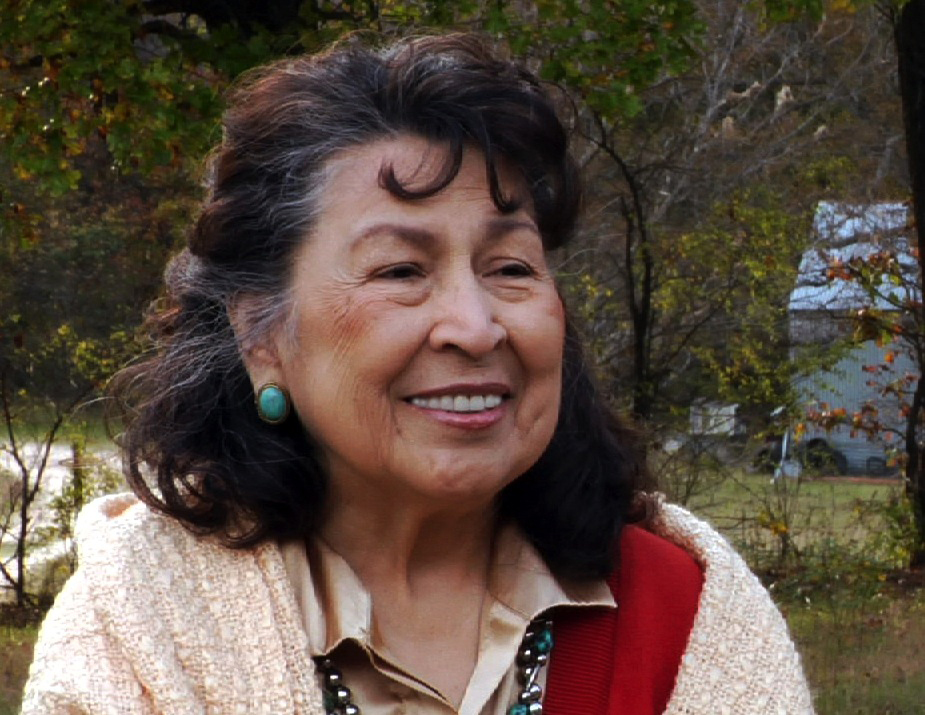 Margaret McKane Mauldin dedicated her life to revitalizing and teaching the Mvskoke language. She grew up speaking the language in her family’s original allotment home west of Okemah, Oklahoma, with her mother, who refused to ever speak English. As an adult, she recognized the decline of the Mvskoke language among the Creek people. Efforts by the state government to declare English the only official language of Oklahoma inspired her to take action. She began developing curriculum and teaching the language and traditional Creek hymns in her home. Her work drew the attention of linguist Jack Martin, with whom she spent many years documenting the language. Together they co-authored A Dictionary of Creek / Muscogee, and several collections of stories in the language with English translation.
Margaret McKane Mauldin dedicated her life to revitalizing and teaching the Mvskoke language. She grew up speaking the language in her family’s original allotment home west of Okemah, Oklahoma, with her mother, who refused to ever speak English. As an adult, she recognized the decline of the Mvskoke language among the Creek people. Efforts by the state government to declare English the only official language of Oklahoma inspired her to take action. She began developing curriculum and teaching the language and traditional Creek hymns in her home. Her work drew the attention of linguist Jack Martin, with whom she spent many years documenting the language. Together they co-authored A Dictionary of Creek / Muscogee, and several collections of stories in the language with English translation.
From 1996 to 2014 she taught the Mvskoke language at the University of Oklahoma. Her work continues to inspire the next generation of Mvskoke speakers and teachers. Her legacy as a language teacher at OU was carried on by her daughter, Gloria McCarty and her former student, Melanie Frye. Through Margaret McKane Mauldin’s tireless efforts, the Mvskoke language is on much firmer ground.
Curtis Billy
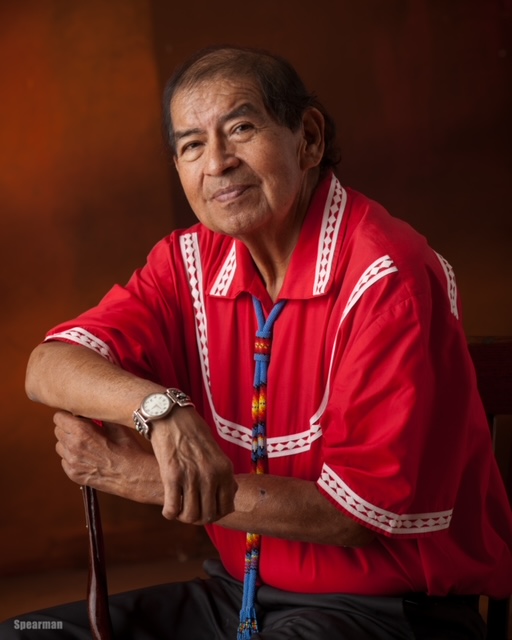 Curtis “Tody” Billy (1951-2023) was a lifelong educator, fluent Choctaw speaker, culture carrier, artist, church elder, and youth mentor. His bachelor’s degree and master’s degrees were earned from Southeastern Oklahoma State University in Durant, OK. He was blessed to be able to spend his career serving his community in Broken Bow, OK and the Choctaw Nation of Oklahoma in Durant, OK.
Curtis “Tody” Billy (1951-2023) was a lifelong educator, fluent Choctaw speaker, culture carrier, artist, church elder, and youth mentor. His bachelor’s degree and master’s degrees were earned from Southeastern Oklahoma State University in Durant, OK. He was blessed to be able to spend his career serving his community in Broken Bow, OK and the Choctaw Nation of Oklahoma in Durant, OK.
Curtis served on the Oklahoma Native American Youth Language Fair board for 18 years and took a group of students to the first language fair in 2003 in his role as Indian Education Coordinator and Guidance Counselor for Broken Bow Public Schools. He was passionate about preserving the Choctaw language and culture. He also taught language classes at Southeastern Oklahoma State University through the Choctaw Nation of Oklahoma School of Choctaw Language until his passing.
His legacy lives on through many televised and print interviews. The Curtis “Tody” Billy stickball field in Broken Bow, OK was named in his honor. Regarding language and culture, he was quoted as saying “knowing the history and the culture are good, but the language is something that defines us as a people.” He was a firm believer in the language being used to pass on traditions and stories. He never hesitated to impart cultural or spiritual knowledge to others.
Family and friends will forever cherish the many memories of his wisdom, wit, knowledge, and spirituality.
Virginia Espinoza
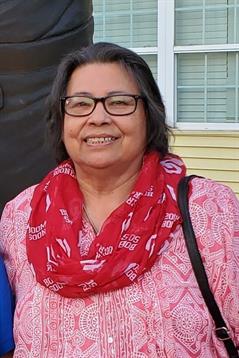 Dr. Rev. Virginia Espinoza was an accomplished and much beloved Choctaw language teacher and pastor. She grew up in Boswell, Oklahoma and attended Boswell School. She earned a degree in teaching from Southeastern Oklahoma State University and soon began working for the Choctaw Nation’s Head Start program in Harmony and Durant. From 2001 onward, she taught the Choctaw language at the Choctaw Nation Headquarters. She considered it a privilege to teach the language. She brought her students to the Oklahoma Native American Youth Language Fair for many years, and also participated in the Fair as a judge.
Dr. Rev. Virginia Espinoza was an accomplished and much beloved Choctaw language teacher and pastor. She grew up in Boswell, Oklahoma and attended Boswell School. She earned a degree in teaching from Southeastern Oklahoma State University and soon began working for the Choctaw Nation’s Head Start program in Harmony and Durant. From 2001 onward, she taught the Choctaw language at the Choctaw Nation Headquarters. She considered it a privilege to teach the language. She brought her students to the Oklahoma Native American Youth Language Fair for many years, and also participated in the Fair as a judge.
Virginia was also known for her service to the Presbyterian Church. She earned a doctorate in theology from Memphis Theological Seminary in 1998. She went on to pastor at many churches throughout Southeastern Oklahoma to the time of her passing. She also served on many Presbyterian Church committees.
Virginia is remembered by those who knew her for her dedication to her faith and teaching the Choctaw language.
Donna Barrone
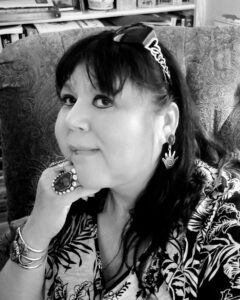 Donna Barrone was born October 6, 1960 and returned to the stars on December 22, 2024. She was a longtime teacher of the Osage Language, and an esteemed cook. She dedicated herself to the cultural needs of her community. As a member of the Osage 𐓬𐓘𐓮𐓶𐓪𐓧𐓣͘ (pah-su-olin) district, she served on the 𐓣͘𐓧𐓪͘𐓯𐓤𐓘 (in-lon-shka) committee for over twenty years for several drum keepers. She was often sought for her knowledge and skill as a cook, and regularly served at functions for the Grayhorse people. She also held various elected positions as a member of the Pahsuelee club for forty-six years. As a language teacher, Donna taught students of all ages in many settings, but particularly enjoyed bringing the community together in Fairfax for language classes and an evening meal. Her contributions to furthering the Osage language and culture are evident in the number of lives she touched. We appreciate her dedication and are grateful for the impact she has left.
Donna Barrone was born October 6, 1960 and returned to the stars on December 22, 2024. She was a longtime teacher of the Osage Language, and an esteemed cook. She dedicated herself to the cultural needs of her community. As a member of the Osage 𐓬𐓘𐓮𐓶𐓪𐓧𐓣͘ (pah-su-olin) district, she served on the 𐓣͘𐓧𐓪͘𐓯𐓤𐓘 (in-lon-shka) committee for over twenty years for several drum keepers. She was often sought for her knowledge and skill as a cook, and regularly served at functions for the Grayhorse people. She also held various elected positions as a member of the Pahsuelee club for forty-six years. As a language teacher, Donna taught students of all ages in many settings, but particularly enjoyed bringing the community together in Fairfax for language classes and an evening meal. Her contributions to furthering the Osage language and culture are evident in the number of lives she touched. We appreciate her dedication and are grateful for the impact she has left.
Phil Raymond Dupoint
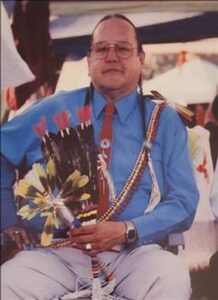 Dr. Phil Raymond ‘Joe Fish’ Dupoint, Topoie, was born in Lawton, Oklahoma, January 25, 1954 to Joseph “Happy” & Georgia (Botone) Dupoint and passed from this earth on January 2, 2025 in Anadarko, Oklahoma at the age of 70. He was raised by his grandmother Celia Maude Hainta.
Dr. Phil Raymond ‘Joe Fish’ Dupoint, Topoie, was born in Lawton, Oklahoma, January 25, 1954 to Joseph “Happy” & Georgia (Botone) Dupoint and passed from this earth on January 2, 2025 in Anadarko, Oklahoma at the age of 70. He was raised by his grandmother Celia Maude Hainta.
Joe took immense pride in the fact that he was a full-blood member of the Kiowa Tribe of Oklahoma and a direct descendant of Chief Sate-T’hai-Day and Chief Ahpeahtone. He grew up in the close-knit community of Carnegie, Oklahoma. where he went to school. He also attended school in Gallup, N.M., and later obtained his GED.
Joe held many titles within his People, of which he was a devoted member of the Kiowa Native American Church, Headsman for the Kiowa Gourd Clan, ‘Grandpa Rabbit’ for the Kiowa Gourd Clan, and the Principal Singer for Kiowa Black Leggings Society. He traveled extensively throughout the country leading his drum group Bad Medicine, where they won many competitions and made relations with many that he held close. His life’s work was sharing his knowledge of Kiowa teachings and protocol, and he was a former Project Coordinator for the Kiowa Language Program, and was currently employed by the Kiowa Tribe as Tribal Historian. One of his greatest achievements was being honored by Bacone College in receiving an Honorary Doctorate of Humane Letters for his contribution to the cultural, spiritual, and ceremonial health and well-being of the Kiowa People.
In a 2013 interview with documentarian Philip Bally, Dupoint said his traditions were central to his identity — the touchstone to which he returned again and again.
“I love being a part of it…I do the best I can to uphold my traditions and my culture, because the only thing I can say is that God Almighty made me who I am,” Dupoint said. “He made me a Kiowa. He didn’t make me nothing else. So I love my traditions as a Kiowa. I love them.”
Martha Nell Poolaw
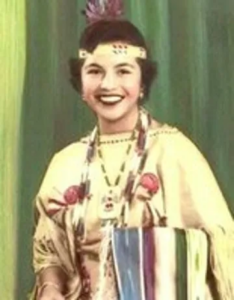 Martha Nell ‘Marti’ (Xó:gútqómà ‘Yellow Stone Woman’) Kauley Poolaw, 85, was born in her family home in Carnegie, OK. She was an enrolled member of the Kiowa Tribe.
Martha Nell ‘Marti’ (Xó:gútqómà ‘Yellow Stone Woman’) Kauley Poolaw, 85, was born in her family home in Carnegie, OK. She was an enrolled member of the Kiowa Tribe.
She graduated from Carnegie High School in 1958 and earned a bachelor’s degree from the University of Science and Arts of Oklahoma in Chickasha, OK, in 1978. She married Robert ‘Corky’ Poolaw on May 31, 1957 and joined him at MCB Twenty-Nine Palms one year later. After raising her three children, she began working for the Department of Defense in accounting at MCB Camp Pendleton, California; Hickam Air Force Base, Hawaii; and over fifteen years at Tinker Air Force Base in Oklahoma City. Her assignments at TAFB included working as a logistics management specialist for the B-1 Stealth Bomber program, overseeing the modifications on B-1 bombers, and the B-2 Stealth Bomber program. After retiring from the Department of Defense in 2008, Marti was employed by the Native American Language Program at the University of Oklahoma. She taught Intermediate Kiowa from August 2012 until her second retirement in April 2024.
Marti was a dedicated preservationist and benefactor of the Kiowa culture and language. She acted as an advisor and translator for Kiowa words and phrases used in movies, television, and artwork. She served on the Kiowa Language Credential Board, certifying and mentoring candidates pursuing a career teaching the Kiowa language. She was a tribal consultant for Kiowa dance and dress. Marti was also a member of the Kiowa Tribal Princess Sorority, having represented the Kiowa Tribe as their princess at the 1956 American Indian Exposition, and was a mentor and inspiration for many young women who served as Kiowa Tribal Princess. She was a dedicated supporter of the Native American Marine Corps Veterans, Kiowa Gourd Clan, Kiowa Ohomah Lodge, and Kiowa Black Leggings organizations. Marti was one of a handful of first-language Kiowa speakers remaining at the time of her passing, though thanks in part to her efforts, many are now learning Kiowa as a second language.
Her interests included traveling with her family and collecting art and beadwork from different tribes.
Josephine Wildcat Bigler
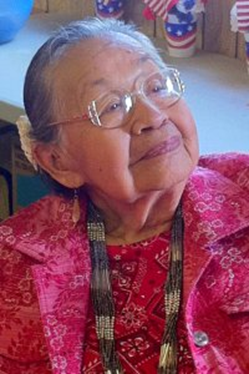
Lana Grant

Kelly Haney
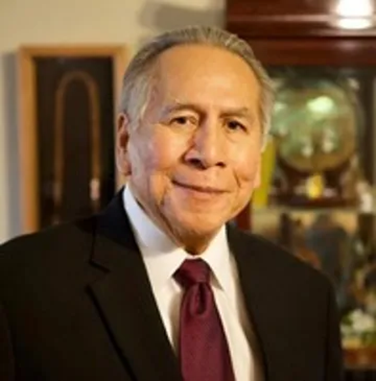
Henry Lieb
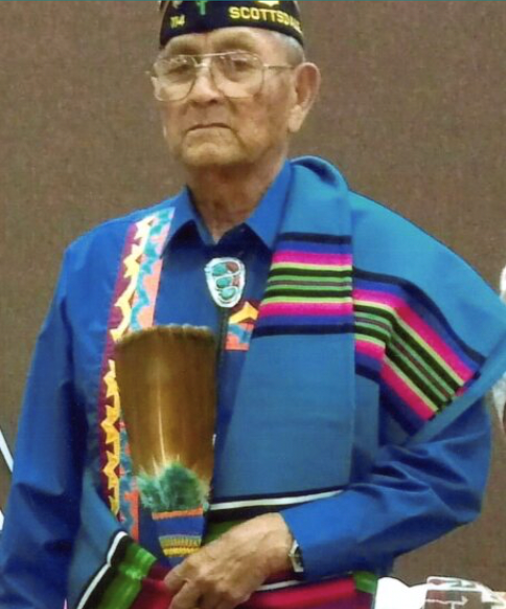
Leroy Sealy
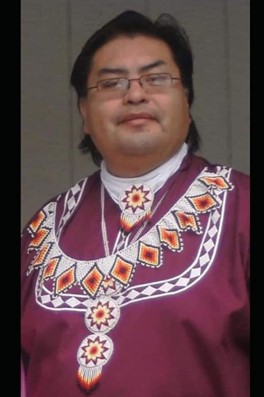
Joyce Twins

Viola Zumwalt
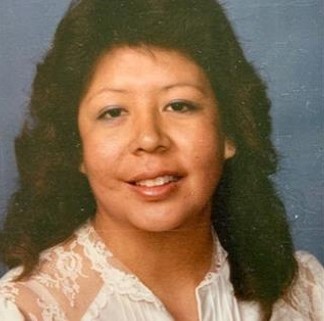
Virgil Swift
Shirley Davilla

